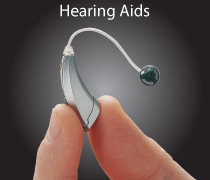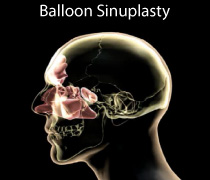Ménière’s Disease
Ménière’s disease (also called idiopathic endolymphatic hydrops) is one of the most common causes of dizziness originating in the inner ear. In most cases only one ear (unilateral) is involved, but both ears (bilateral) may be affected.
Ménière’s disease typically affects people between the ages of 40- and 60-years-old and can impact anyone. Occasional symptoms include vertigo (attacks of a spinning sensation), hearing loss, tinnitus (a roaring, buzzing, or ringing sound in the ear), and a sensation of fullness in the affected ear. These episodes typically last from 20 minutes up to eight to 12 hours.
Hearing loss is often intermittent, occurring mainly at the time of the attacks of vertigo. Loud sounds may seem distorted and cause discomfort. Usually, the hearing loss involves mainly the lower frequencies, but over time this often affects higher tones as well. While hearing loss initially fluctuates, it often becomes more permanent as the disease progresses.
What Are the Symptoms of Ménière's Disease?
Ménière’s disease symptoms may include:
- Dizziness or vertigo (attacks of a spinning sensation)
- Hearing loss
- Tinnitus (a roaring, buzzing, or ringing sound in the ear)
- Sensation of fullness in the affected ear
- Symptoms tend to come and go together
What Causes Ménière's Disease?
Although the cause is unknown, Ménière’s disease symptoms are due to increased volume of fluid in the inner ear. Too much fluid may accumulate either due to excess production or inadequate absorption. In some individuals, especially those with involvement of both ears, allergies or autoimmune disorders may play a role in producing Ménière’s disease. In some cases, other conditions may cause symptoms similar to those of Ménière’s disease.
People with Ménière’s disease have a “sick” inner ear and are more sensitive to factors such as fatigue and stress that may influence the frequency of attacks.
To find out how to help and what is causing this condition, your physician will take a history of the frequency, duration, severity, and character of your attacks, the duration of hearing loss, or whether it has been changing, and whether you have had tinnitus or fullness in either or both ears. When the history has been completed, diagnostic tests to assess your hearing and balance may be performed. They may include:
Hearing tests—An audiometric examination (hearing test) typically shows a sensory type of hearing loss in the affected ear. Speech discrimination (the patient’s ability to tell one word from another) is tested as well.
Balance tests—An electronystagmogram (ENG) test may be performed to measure balance by following eye movement when warm and cool water, or air, are inserted into the ear. Often this shows that the balance function is reduced in the affected ear. Rotational or balance platform testing may also be used to evaluate balance.
Other tests—Electrocochleography (ECoG) looks for inner ear fluid pressure in some cases of Ménière’s disease. Other hearing and imaging may help to rule out other causes as well.
What Are the Treatment Options?
Although there is no cure for Ménière’s disease, the attacks of vertigo can be controlled in nearly all cases. Treatment options include:
- A low salt diet and a diuretic (water pill)
- Anti-vertigo medications (used to stop acute attacks)
- Intratympanic injection with either dexamethasone or gentamicin
- Surgery
Your ENT (ear, nose, and throat) specialist, or otolaryngologist, will help you choose the treatment that is best for you, as each has advantages and drawbacks. In many people, careful control of salt in the diet and the use of medication to help release extra fluid can control symptoms well.
Treatments aim to save the inner ear parts that work and clear out parts that are permanently injured.
Intratympanic injections inject medication through the eardrum into the middle ear space where the ear bones reside. This treatment is done in your ENT specialist’s office one or more times. One type of medication, Gentamicin, eases dizziness but may increase hearing loss and worsen overall balance. Corticosteroids do not cause hearing loss but are less helpful for dizzy spells.
Surgery
Surgery is needed in only a small minority of patients with Ménière’s disease. If vertigo attacks are not controlled by conservative measures and are disabling, a surgical procedure might be recommended.
Labryrinthectomy and eighth nerve section are procedures in which the balance and hearing mechanism in the inner ear are destroyed on one side. This is considered when the patient with Ménière’s disease has poor hearing in the affected ear. Labryrinthectomy and eighth nerve section result in the highest rates for control of vertigo attacks.
What Should I Do If I Have an Attack of Ménière's Disease?
Lie flat and still, and focus on an unmoving object. You might even fall asleep while lying down and feel better when you wake up.
Take vestibular suppressants including meclizine, which calm the inner ear.
To help prevent an attack, avoid stress and excess salt ingestion, caffeine, smoking, and alcohol. Get regular sleep and eat properly. Remain physically active, but avoid excessive fatigue. Consult your ENT specialist about other treatment options.
What Questions Should I Ask My Doctor?
- Can my hearing loss be treated?
- What are other closely related diagnoses?
Hyperthyroidism
Hyperacusis
Hyperacusis, or sensitive hearing, describes a problem in the way the brain’s central auditory processing center perceives noise, often leading to pain and discomfort. People with hyperacusis have a hard time tolerating sounds that are typically not loud to others, such as noise from running water, traffic or riding in a car, walking on leaves, shuffling papers, running the dishwasher or other machines, and more. Although all sounds may be perceived as too loud, high frequency sounds may be particularly troublesome.
Many people experience sensitivity to sound, but true hyperacusis is rare, affecting approximately one in 50,000 individuals. It can affect people of all ages in one or both ears, and is often associated with tinnitus, or ringing in the ears. Nearly 36 million Americans suffer from tinnitus; an estimated one in every thousand also has hyperacusis. People can have tinnitus and hyperacusis at the same time.
It’s no surprise that hyperacusis can have a big impact on quality of life for people living with this condition. For those with a severe intolerance to sound, it’s difficult and sometimes impossible to function in ordinary environments with all of today’s ambient noise. That’s why hyperacusis can lead to withdrawal, social isolation, fear of normal sounds (called phonophobia), and depression.
What Are the Symptoms of Hyperacusis?
Symptoms of hyperacusis can include:
- Sensitivity to everyday sounds, often beginning in one ear then progressing to both ears
- Difficulty tolerating ordinary environments and situations
- Isolation
- Pain, or physical discomfort with sounds
What Causes Hyperacusis?
People are not born with hyperacusis, but some can develop an increased sensitivity to sound later in life. While a clear cause is commonly unidentifiable, possible causes include:
- Head injury
- Exposure to loud noise(s)
- Ear damage from toxins or medication
- Lyme disease
- Air bag deployment
- Viral infections involving the inner ear or facial nerve (Bell's palsy)
- Temporomandibular joint (TMJ) syndrome
There are a variety of neurologic conditions that may be associated with hyperacusis, including:
- Post-traumatic stress disorder (PTSD)
- Chronic fatigue syndrome
- Tay-Sach’s disease (a rare, inherited disorder that destroys nerve cells in the brain and spinal cord)
- Some forms of epilepsy
- Valium dependence
- Migraine headaches
- Depression
- Anxiety, mood swings, with increased heart rate, sweating
Hyperacusis can be seen in children with brain injuries (often with other sensory sensitivities), some autistic children, and some children with cerebral palsy.
If you think you or a loved one may have hyperacusis, you should seek an evaluation by an ENT (ear, nose, and throat) specialist, or otolaryngologist. The initial consultation is likely to include a full audiologic evaluation (with hearing test), medical history review, and a medical evaluation. Your doctor should also provide counseling about their findings, as well as possible treatment options.
What Are the Treatment Options?
There are no specific surgical or medical treatments to correct hyperacusis. However, sound therapy may be used to retrain the auditory processing center of the brain to accept everyday sounds. Your doctor may have you wear a noise-generating device on the affected ear, or both ears. The device produces a gentle, static-like sound (white noise) that is barely audible. Sound therapy can take up to 12 months to complete, and often improves sound tolerance.
Hearing tests for hyperacusis may indicate normal hearing sensitivity, but this does not mean that someone with hyperacusis can hear better than others. “Recruitment” is another type of sound sensitivity, a condition where soft sounds cannot be heard, and loud sounds are distorted or intolerable. For example, a person with Recruitment may have hearing loss below 50 decibels. At the same time, sound above 80 decibels may be intolerable, resulting in a narrow range of comfortable hearing.
What Questions Should I Ask My Doctor?
- What are my treatment options for hyperacusis?
- Can using a cotton ball or ear plug be effective in treating hyperacusis?
- What tests should I have performed?
- Do I need to get an MRI to rule out common causes of hyperacusis?
- Are there any effective, available medications?
- Can treating my anxiety help my condition?
Hoarseness
Hoarseness (also called dysphonia) is an abnormal change in the quality of your voice, making it sound raspy, strained, breathy, weak, higher or lower in pitch, inconsistent, fatigued, or shaky, often making it harder to talk. This usually happens when there is a problem in the vocal cords (or folds) of your voice box (larynx) that produce sound. Your vocal cords are separated when you breathe, but when you make sound, they come together and vibrate as air leaves your lungs. Anything that alters the vibration or closure of the vocal cords results in hoarseness.
You can read recently published recommendations on the evaluation of hoarseness in this “Plain Language Summary for Patients: Hoarseness (Dysphonia).” 1,2
What Are the Symptoms of Hoarseness?
If you have any of these symptoms for hoarseness, you should see an ENT (ear, nose, and throat) specialist, or otolaryngologist, as soon as you can:
- Hoarseness that lasts more than four weeks, especially if you smoke
- Severe changes in voice lasting more than a few days
- Voice changes, such as raspy, strained, breathy, weak, higher or lower in pitch, inconsistent, fatigued, or shaky voice
- Difficult breathing
- Pain when speaking
- Vocal professionals (singer, teacher, public speaker) who cannot do their job
What Causes Hoarseness?
Acute laryngitis—The most common cause of hoarseness is acute laryngitis. A cold, viral infection in your breathing tract, or voice strain can make your vocal cords swell. You can seriously damage your vocal cords if you talk while you have laryngitis.
Non-cancerous vocal cord lesions—Nodules, polyps, and cysts usually develop after prolonged trauma to the vocal cords from talking too much, too loudly, or with bad technique.
Pre-cancerous or cancerous lesions—Pre-cancer or cancerous lesions on the vocal cords can also cause hoarseness. If it lasts four weeks or more, or if you are at a higher risk of developing throat cancer (i.e., you smoke), you should have your voice box evaluated by an ENT specialist.
Neurological diseases or disorders—Hoarseness can occur with Parkinson’s disease or after a stroke. A rare disorder called spasmodic dysphonia can also create hoarseness or uneasy breathing. A paralyzed vocal cord, usually after surgery, viral illness, or injury, may also cause a weak, breathy voice.
Vocal cord atrophy—As we age, our vocal cords become thinner (decreased bulk) and floppy (decreased tone). This is not due to talking too much or too little, it’s just a fact of life. A raspy voice that changes from day to day with decreased power is common.
Vocal cord hemorrhage—You can lose your voice after yelling or other strenuous vocal activity if a blood vessel/blood blister breaks, filling the vocal cord with blood. This is a vocal emergency and should be treated with complete voice rest and examination by an ENT specialist.
Are There Related Factors or Conditions?
Reflux—Reflux is when acidic or non-acidic stomach contents move from the stomach up into your swallowing tube (the esophagus). Classic heartburn and indigestion are symptoms of gastroesophageal reflux (GERD), which is caused by acid. If the stomach acid travels up the esophagus and spills into the throat or voice box (called the pharynx/larynx), it is known as laryngopharyngeal reflux (LPR).
Smoking—Most importantly, smoking increases the risk of developing throat cancer. Smoking can also cause permanent changes to your vocal cords that can lead to swelling, which lowers the pitch of your voice and can block the airway in severe cases. Smokers who develop hoarseness should see an ENT specialist right away.
Other—Other related factors such as allergies, thyroid problems, trauma to the voice box, and, occasionally, menstruation can contribute to hoarseness.
What Are the Treatment Options?
An ENT specialist needs to obtain your medical history and look at the voice box (larynx) with special equipment before they can determine what’s causing your hoarseness and recommend treatment options. They may pass a very small, lighted flexible tube with a camera (called a fiberoptic scope) through your nose to view your vocal cords. Most patients tolerate these procedures well. Sometimes, it helps to measure voice irregularities, how the voice sounds, airflow, and other characteristics to help decide how to treat your hoarseness.
Appropriate treatment depends on the cause of your hoarseness.
Acute laryngitis—Supportive care and voice rest are usually the recommended courses of action for acute laryngitis. Antibiotics and steroids are often not needed, and your primary care physician can manage this. If your hoarseness lasts beyond typical cold symptoms, however, you should see an ENT specialist.
Non-cancerous vocal cord lesions—Treatment for non-cancerous vocal cord lesions includes learning proper voicing technique with voice therapy, adequate hydration, and sometimes surgery.
Pre-cancerous or cancerous lesions—Surgery is needed to diagnose and treat pre-cancerous or cancerous lesions. Sometimes, other cancer treatments are needed, such as radiation therapy or chemotherapy.
Neurological diseases or disorders—Determining why your vocal cords are paralyzed helps your doctor decide the best course of action. Sometimes, vocal cord augmentation is needed. For patients with Parkinson’s disease, special voice techniques can help, but evaluation is also very important. Mumbled speech (called dysarthria) after a stroke or from a degenerative neurologic disorder can be addressed with speech therapy or the use of assistive communicative devices. Other disorders can be treated with botulinum toxin, or Botox®, injections.
Vocal cord atrophy—Treatment for vocal cord atrophy includes voice therapy and, sometimes, vocal cord injection, but reassurance from your doctor that your hoarseness is not due to cancer may be all that you need for peace of mind.
Vocal cord hemorrhage—Treatment usually includes resting your voice and avoiding blood thinners. Surgery is rarely needed.
Are There Potential Dangers or Complications?
Depending on the cause of your hoarseness, long-term concerns range from permanent hoarseness, inability to effectively communicate with others, loss of work for vocal professionals, to major surgery or, in severe cases, death from cancer and cancer-related treatments. That’s why it’s very important to see an ENT specialist to be evaluated for persistent hoarseness.
General vocal wellness tips include:
- Avoid speaking in loud environments.
- Be aware of how much and how loudly you are talking.
- Use a microphone or other type of voice amplification if your job requires a lot of talking (like teaching or public speaking).
- Drink plenty of water, usually around 60 ounces daily. This helps thin out mucus.
- Avoid large amounts of caffeine, such as caffeinated coffee, tea, and soda.
- Stop smoking and avoid secondhand smoke. This is a good idea for all smoked products.
What Questions Should I Ask My Doctor?
- What is the cause of my hoarseness?
- Are any of my medications drying me out?
- When should I see a specialist?
References
- Stachler RJ, Francis DO, Schwartz SR, Damask CC, Digoy GP, Krouse HJ, McCoy SJ, Ouellette DR, Patel RR, Reavis CCW, Smith LJ, Smith M, Strode SW, Woo P, Nnacheta LC. Clinical Practice Guideline: Hoarseness (Dysphonia) (Update). Otolaryngol Head Neck Surg. 2018 Mar;158(1_suppl):S1-S42.
- Stachler RJ, Francis DO, Schwartz SR, Damask CC, Digoy GP, Krouse HJ, McCoy SJ, Ouellette DR, Patel RR, Reavis CCW, Smith LJ, Smith M, Strode SW, Woo P, Nnacheta LC. Clinical Practice Guideline: Hoarseness (Dysphonia) (Update) Executive Summary. Otolaryngol Head Neck Surg. 2018 Mar;158(3):409-426.












